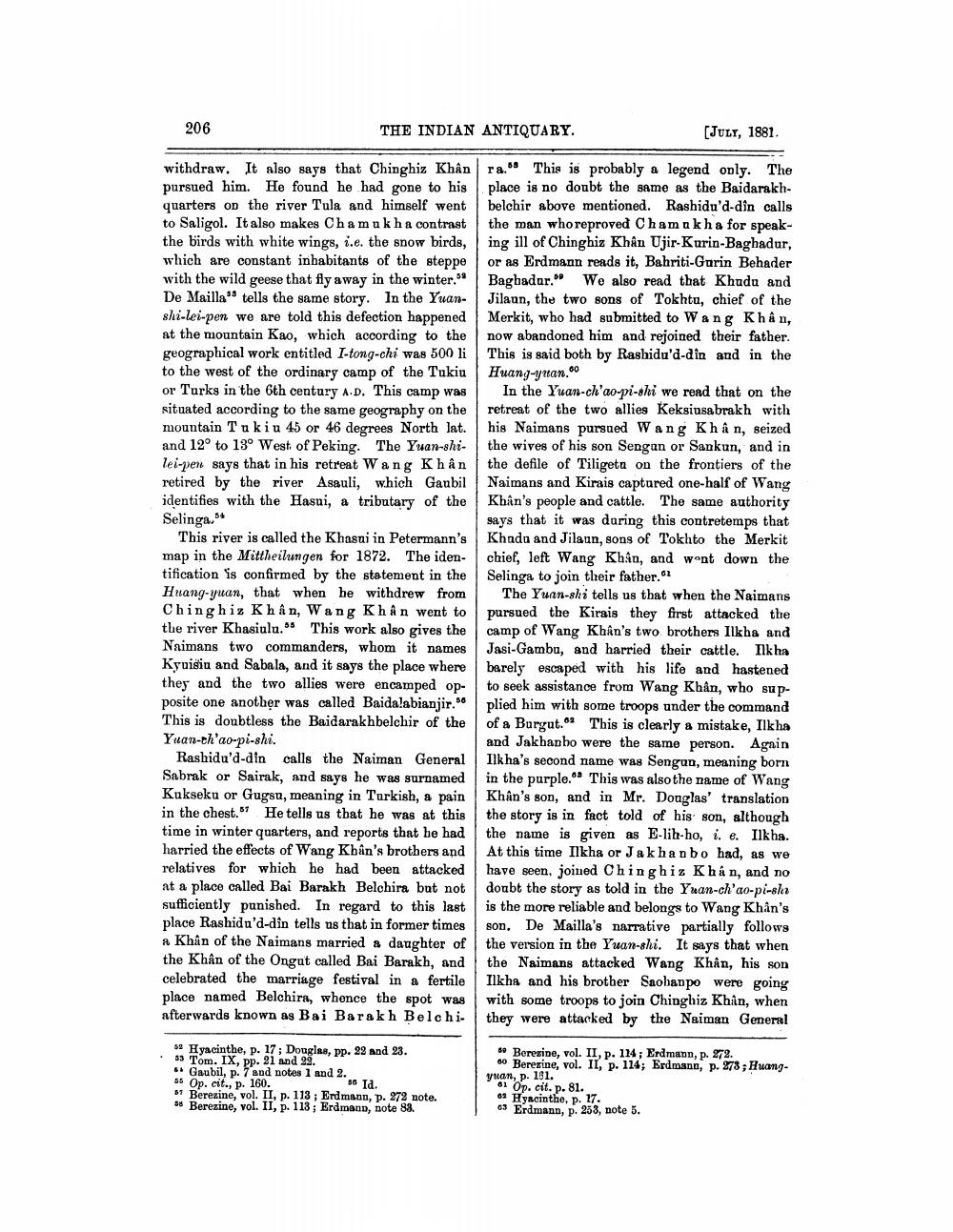________________
206
THE INDIAN ANTIQUARY.
[JULY, 1881
withdraw. It also says that Chinghiz Khận ra. This is probably a legend only. The pursued him. He found he had gone to his place is no doubt the same as the Baidarakhquarters on the river Tula and himself went belchir above mentioned. Rashidu'd-dîn calls to Saligol. It also makes Chamukh a contrast the man who reproved Chamakha for speakthe birds with white wings, i.e. the snow birds, ing ill of Chinghiz Khân Ujir-Kurin-Baghadur, which are constant inhabitants of the steppe or as Erdmann reads it, Bahriti-Garin Behader with the wild geese that fly away in the winter." Baghadur." We also read that Khudu and De Mailla" tells the same story. In the Yuan- Jilaun, the two sons of Tokhta, chief of the shi-lei-pen we are told this defection happened Merkit, who had submitted to Wang Khân, at the mountain Kao, which according to the now abandoned him and rejoined their father. geographical work entitled I-tong-chi was 500 li This is said both by Rashidu'd-din and in the to the west of the ordinary camp of the Tukiu Huang-yuan. or Turks in the 6th century AD. This camp was In the Yuan-ch'ao-pi-shi we read that on the situated according to the same geography on the retreat of the two allies Keksiusabrakh with mountain Tukiu 45 or 46 degrees North lat. his Naimans pursued Wang Khân, seized and 12° to 13° West of Peking. The Yuan-shi. the wives of his son Sengan or Sankun, and in lei-pen says that in his retreat Wang Khân the defile of Tiligeta on the frontiers of the retired by the river Asauli, which Gaubil Naimans and Kirais captured one-half of Wang identifies with the Hasui, a tributary of the Khân's people and cattle. The same authority Selinga."
says that it was daring this contretemps that This river is called the Khasui in Petermann's Khadu and Jilaan, sons of Tokhto the Merkit map in the Mittheilungen for 1872. The iden- chief, left Wang Khan, and wont down the tification is confirmed by the statement in the Selinga to join their father. Huang-yuan, that when he withdrew from The Yuan-sha tells us that when the Naimans Chinghiz Khan, Wang Khan went to pursued the Kirais they first attacked the the river Khasiulu. This work also gives the camp of Wang Khan's two brothers Ilkha and Naimans two commanders, whom it names Jasi-Gambu, and harried their cattle. Ilkha Kyuisiu and Sabala, and it says the place where barely escaped with his life and hastened they and the two allies were encamped op- to seek assistance from Wang Khân, who supposite one another was called Baida!abianjir." plied him with some troops under the command This is doubtless the Baidarakhbelchir of the of a Burgut. This is clearly a mistake, Ilkha Yuan-ch'ao-pi-shi.
and Jakbanho were the same person. Again Rashidu'd-din calls the Naiman General | Ilkha's second name was Sengun, meaning born Sabrak or Sairak, and says he was surnamed in the purple. This was also the name of Wang Kukseku or Gugsn, meaning in Turkish, a pain Khan's son, and in Mr. Douglas' translation in the chest. He tells us that he was at this the story is in fact told of his son, although time in winter quarters, and reports that he had the name is given as E-lih-ho, i.e. Ilkha. harried the effects of Wang Khân's brothers and At this time Ilkha or Jakhanbo had, as we relatives for which he had been attacked have seen, joined Chinghiz Khán, and no at a place called Bai Barakh Belchira but not doubt the story as told in the Yuan-ch'ao-pi-sha sufficiently punished. In regard to this last is the more reliable and belongs to Wang Khan's place Rashidu'd-din tells us that in former times son. De Mailla's narrative partially follows a Khan of the Naimans married a daughter of the version in the Yuan-shi. It says that when the Khân of the Ongut called Bai Barakh, and the Naimans attacked Wang Khản, his son celebrated the marriage festival in a fertile Ilkha and his brother Saobanpo were going place named Belchira, whence the spot was with some troops to join Chinghiz Khin, when afterwards known as Bai Barakh Belchi. they were attacked by the Naiman General
5 Hyacinthe, p. 17; Douglas, pp. 22 and 23. 53 Tom. IX, pp. 21 and 23. ** Gaubil, p. 7 and notes 1 and 2. 55 Op. cit., p. 160. 11 Berezine, vol. II, p. 113, Erdmann, p. 972 note. 5 Berezine, vol. II, p. 113 ; Erdmann, note 88.
50 Id
50 Berezine, vol. II, p. 114; Erdmann, p. 272.
60 Berezine, vol. II, p. 114; Erdmann, p. 278; Huangyuan, p. 161.
61 Op. cit. p. 81. 61 Hyacinthe, p. 17. 63 Erdmann, p. 253, note 5.




